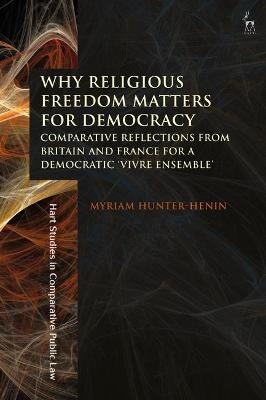
Why Religious Freedom Matters for Democracy
Hart Publishing (Verlag)
978-1-5099-0474-7 (ISBN)
Myriam Hunter-Henin is Reader in Law and Religion and Comparative Law at University College London.
1. Introduction
I. Goals of the Book
A. The Method of Avoidance
B. The Principle of Inclusion
C. The Principle of Revision
D. The Analogous-to-Secular View
E. The Accommodationist View
II. Summary of My Main Argument
A. Implications for Law
B. Implications of My Argument for Theories of Democracy and Legal Pluralism
C. A Contextual and Comparative Approach
III. Structure of the Argument
IV. Conclusion
PART I
THE BROKEN VIVRE ENSEMBLE – OBSERVATIONS AND SOLUTIONS
2. Contextual Analyses: Laïcité and the Democratic Vivre Ensemble
I. The Historical Layers of Laïcité: From Hostility to Tolerance Towards Religion
A. Laïcité: A Militant Form of Secularism?
B. Laïcité: From Militant to Separatist and Liberal Secularism
C. Conclusion to Section I
II. Laïcité, Common Values and Islam
A. Recent Extensions of Laïcité
B. Gilles Kepel’s Laïcité
C. Communautarian versus Inclusive Laïcité
D. Conclusion to Section II
III. Conclusion to Chapter 2
3. Contextual Analyses: The English Experience of Vivre Ensemble
I. Church Establishment: An Inclusive Type of Secularism?
A. The Possibility of Church Establishment
B. English Establishment: An Inclusive Form of Secularism
C. Conclusion to Section I
II. British Values, Religious Autonomy and Liberalism
A. Religious Minorities in England
B. The Decline of Religious Autonomy in English Law
C. Conclusion to Section II
III. Conclusion to Chapter 3
4. Conceptual Framework: The Liberal Democratic Vivre Ensemble
I. Why Religious Freedom Matters for Democracy
A. The Dilution of Religious Freedom
B. The Isolation of Religious Freedom
C. Conclusion to Section I
II. Why Pluralism Matters for Democracy and Religious Freedom
A. Self-restraint, Religious Freedom and Pluralism
B. Pluralism, Religious Freedom and Public Reason
C. Conclusion to Section II
III. Conclusion to Chapter 4
PART II
CASE STUDIES: THE MENDED VIVRE ENSEMBLE
5. Lessons from Achbita
I. Spheres Over Principles
A. The Contractual Sphere: The Non-interventionist Ordoliberal Baseline Argument
B. The National Sphere: Alleged Deference to the Constitutional Laïque Context
C. Conclusion to Section I
II. Consistency Over Proportionality
A. Introductory: The Eweida Case
B. Burdens of the Consistency Argument for Religious Employees’ Claims
C. Proportionality Test Reduced Mainly to Procedural Consistency
D. Conclusion to Section II
III. Conclusion to Chapter 5
6. Beyond Achbita: Possible Ways Forward
I. Laïcite: Deference Rather than Delegation
A. Ebrahimian: An Extensive Deference to Laïcité
B. From Ebrahimian to Achbita: From Deference to Laïcité to Delegation to National Authorities
C. Conclusion to Section I
II. Proportionality Rather than Autonomy
A. The Rejection of the Church Autonomy Argument in Egenberger
B. Guidelines from the ECtHR’s Case Law
C. Conclusion to Section II
III. Religious Freedom and Equality Rights
A. Balancing Private Interests in the Context of Legislative Ambiguities
B. Balancing Private Interests in a US Context
C. Conclusion to Section III
IV. Conclusion to Chapter 6
V. Conclusion of Part II
7. Conclusion
I. For a Democratic Approach to Religious Freedom
A. Comparative Demonstration
B. Normative Demonstration
II. Consequences of the Democratic Approach for the Courts
A. Clues Relating to the Assessment of the Religious Claim
B. Against Delegation to Employers
C. For a Nuanced Deference to National Traditions
D. Comments on Proportionality
E. A Word on Brexit
| Erscheinungsdatum | 15.06.2020 |
|---|---|
| Reihe/Serie | Hart Studies in Comparative Public Law |
| Verlagsort | Oxford |
| Sprache | englisch |
| Maße | 156 x 234 mm |
| Gewicht | 494 g |
| Themenwelt | Recht / Steuern ► Allgemeines / Lexika |
| Recht / Steuern ► EU / Internationales Recht | |
| Recht / Steuern ► Öffentliches Recht ► Verfassungsrecht | |
| ISBN-10 | 1-5099-0474-3 / 1509904743 |
| ISBN-13 | 978-1-5099-0474-7 / 9781509904747 |
| Zustand | Neuware |
| Haben Sie eine Frage zum Produkt? |
aus dem Bereich


